- Home
- Jack Hardin
Lonely Coast Page 2
Lonely Coast Read online
Page 2
Ellie stepped over to the door and slid it back. “Hey, Eeyore, you want some cold cuts?”
Citrus turned and looked at her, swung his head back in the general direction of the water, and then slowly crossed the tiny yard like he’d been told to come in and do his chores. His owner shut the door behind him.
“It won’t be forever, you know. It has to die sometime.”
The dog huffed like he didn’t appreciate her humor and then started into the treat his owner had tossed in his bowl.
Using a flat-tip screwdriver, Ellie worked it around the top edge of the paint can until she had the lid off. Her dining room wall was currently a light gray, but she decided last week that she wanted to darken it a little. She was reaching for the wooden stir stick when her phone buzzed on the counter behind her. It was her boss, Supervisory Special Agent Phillip Rhodes.
“Hey, Phil.”
“Ellie, I know it’s your day off, but I’m going to need you to come in.” His voice was heavy. “Have you seen the news?”
She typically made it a point not to watch the news. There was too much arguing and intellectual chaos and, it seemed, a commitment on the part of the producers to feed viewers with a constant diet of information that served to instill more fear or anxiety in them than hope or optimism. Her general philosophy about the news was that if it was important enough to know, she’d hear about it at work or the bar. What she didn’t hear about during the week was brought to her attention in the weekend edition of the Wall Street Journal, which was thrown onto her front porch every Saturday morning. Ellie was only thirty-five, but in many ways, she felt like an old soul. Scrolling down a computer screen to check an online edition of a news article had nothing on the crinkling of the newspaper, the familiar smell of the pulp and the ink.
“No,” she answered.
“There was a domestic terrorism event in Tampa fifteen minutes ago. An explosion on a city transport bus.”
Ellie closed her eyes. “How many casualties?”
“Too early to say. But it’s bad. Be here in thirty and plan for a late night.” Phil hung up.
It was twenty-five minutes to the office doing the speed limit.
Ellie returned the lid to the paint can and tapped it with the butt end of the screwdriver. Slipping down the hall, she grabbed a hair tie from the handle of her bedroom door. She slung her still-damp hair into a ponytail and opened her closet door.
She would be there in twenty.
Ellie pulled her Silverado up to the narrow guardhouse monitoring access to the one-story federal building. She plucked her badge from the console, rolled down her window, and extended it to the guard. “Hey, Seth.”
Seth Morris’s blond hair was cut in a high-and-tight, a carryover from the ten years he’d spent as a non-commissioned officer in the Army. He wore standard-issue cargo pants, and his thick arms and chest swelled underneath a dark blue polo. His plump face and muscular frame reminded Ellie of Virgil, her old CIA teammate. During the eight years she had been a member of TEAM 99, Virgil had become an elder brother of sorts. Whenever she saw Seth, it was all she could do to push Virgil’s fate to the back of her mind.
“Hey, Ellie.” His face was drawn tight. “They called you in about the bombing?” He took her badge and scanned it with a handheld device.
“Yeah.”
“I did two tours in Afghanistan,” he said, “and I saw some stuff. I still can’t believe we live in the kind of world where people get their kicks by blowing up buses in the middle of the city.” He handed back her badge.
“I can’t either,” she said quietly. With each passing year, she became more convinced that there was nothing the human heart was not capable of. Its dark, circuitous caverns hid all manner of malice and evil, a breeding ground of hate and ill-will until it finally erupted upon those who had not allowed such things to fester in their own hearts.
Seth reached a hand into the guardhouse and punched a button on the inside of the door. The gate in front of her shuddered and opened to her left. “Thanks for coming in,” he said. Just before she took her foot off the brake, Seth spoke again. “Hey, Ellie?”
“Yeah?”
“Get those bastards.”
She nodded and then rolled up her window. The steel one-way spikes lowered under the weight of the truck as the tires moved across them and clicked back up once they passed.
Nearly a year ago, after a young boy’s dead body was connected to the local drug trade, Ellie had joined the Fort Myers’ branch of the Drug Enforcement Administration. Garrett Cage, an old friend of hers from high school, had been the local Special Agent in Charge and the one to offer Ellie the badge. For several months, the team of federal agents worked to unravel an underground drug network. Ellie never could have imagined that the investigation would have led where it did, nor to whom. When it was all said and done, and the last set of handcuffs were clicked around the last pair of guilty wrists, Ellie decided to take some time away and get back to the quiet and easy living that she valued so much.
But fate, it seemed, would not excuse her from a life of chasing down criminals and protecting the innocent. Three months ago, after Ellie had fallen headfirst into a private investigation that led her to the rescue of a kidnapped young lady and taking down a ring of sex traffickers, Homeland had approached her about joining a newly formed interagency task force that would be focused on pushing back crime in key areas of the country: Chicago, L.A., Houston, and Southwest Florida. Ellie had finally said yes to the opportunity, finding herself once again with a badge, a sidearm, and a top-down mandate to find the worst that humanity had to offer. Tyler quipped that after her twelve years with the CIA, a short stint with the DEA, and now with her new role at Homeland, Ellie made up a bowl of alphabet soup all on her own.
The ambition behind the task force’s creation was straightforward: James Watson, the Director of Homeland Security, was committed to a policy that ensured the dissemination of information across a multi-jurisdictional and multi-agency environment. The siloing of intelligence often led to a lack of arrests, loss of innocent life, and a country that was far less safe than it could be. Interagency collaboration served to build trust among agencies and to reduce the politics that had higher-ups scrambling for credit and recognition.
The Southwest Florida squad was located in Fort Myers at the back end of an industrial business center complex in Metro Park. On the public side of the guardhouse were suites of offices used by Publix, Exxon, and a Pepsi distributor. The L-shaped parking area hugged the corner of the building, and Ellie navigated the truck to an empty space that was partially shadowed by a live oak. She grabbed a hairbrush from the console and whisked it quickly through her hair before getting out and shutting her door.
It was July in Southwest Florida, which meant that if you spent too much time in the direct sunlight, your hair might catch on fire or you might die of heatstroke before you made it inside. A few clouds slid lazily through the blue sky like loose wisps of cotton candy but did nothing to mitigate against the heat. A narrow strip of well-watered St. Augustine grass lay between the edge of the building and the sidewalk, punctuated with hibiscuses and bottle palms, and Ellie stepped across the grass and walked around to the front door. She scanned her badge at the door and punched a six-digit code into the keypad. The lock produced a muted click, and a merciful stream of cool air greeted her as she pulled open the door and stepped inside.
The interior layout gave the impression that you had just entered a dentist’s office: a small waiting area complete with two love seats, a potted palm whose droopy and drying fronds testified to its neglect, and a glass coffee table filled with old issues of crappy magazines. Why any of it was there Ellie didn’t know. They never brought in guests from the outside. A receptionist’s desk went unused except as a storage area of sorts. A box of office supplies, a stack of outdated and unused laptops, and a defunct printer sat collecting a thin film of dust.
Ellie worked her way down a narrow hallwa
y, passing up the kitchenette and a warren of small offices, including one she shared with her partner. The hallway terminated on an expansive room at the end, where a dozen support personnel worked in roles that ranged from cyber and information analysts to doughnut grabber. She turned off into a conference room where three people were already seated at a dark, elongated table. Phil was at the far end, his cell phone to his ear. He lifted a finger to Ellie by way of greeting and turned away as he continued his conversation. Phil was in his late fifties and had salt-and-pepper hair that he kept trimmed above his ears and tapered along the back of his neck. He had spent his first career as an investigator with NCIS, finally retiring before Homeland got him off the golf course long enough to pitch him a new role. He accepted their offer and spent the last seven years leading a Special Response Team for HSI—Homeland Security Investigations—out of Houston. He and his wife had moved to Fort Myers three months ago for him to serve as the local task force’s Field Director.
The task force was composed of the best of the best; everyone involved had been hand-selected. Rather than personnel that supportive agencies had sloughed off as extra baggage or local irritants, these agents and their accompanying support staff were among the best in their fields: talented, expert, and bright. There was no riff-raff, no one trying to simply slide by until a promotion surfaced or they found a more suitable career path. The team was small but laser-focused, pooling talents, skills, and knowledge from across the law enforcement and intelligence communities into a single team that acted together as one.
Sitting to Phil’s left in one of the room’s many high-backed leather chairs was Pat Lindsey, the mention of whose name typically conjured up images of a woman over that of a man. But a man he was. A great hulking giant of a man, in fact, whose bodily composition consisted of one-third fat and two-thirds muscle. He reminded Ellie of a more recent version of Bonanza’s Hoss Cartwright. He even had the gentle look and deep, drawling voice; the only thing missing was a horse and the ten-gallon hat.
Aaron Parnell was perched next to Pat, looking uncharacteristically pensive and tapping the eraser end of a pencil thoughtfully on the glossy tabletop. Aaron was brilliant with a nearly photographic memory and ability to process information faster than anyone Ellie had ever known. He was but a couple of years older than Ellie, single, and made a habit of flaunting his boyish good looks on anyone willing to pay attention, even at the office—especially at the office—where he drove everyone nuts with his perfectly combed hair, his manicured nails, and a charming smile that made all the men slightly nervous and the ladies generally take notice. His charms were easily offset, however, by a personal decision to become the squad’s jokester. A few weeks ago, he had spent entirely too much time rigging whoopie cushions into the conference room chairs. The week before that, he left a rubber snake in the Folgers can and then signed off for the day. He returned to the office the next morning to find coffee grounds strewn all over the kitchenette and Della Brooks, one of their information analysts who was generally the first to arrive each morning, refusing to clean up the mess. Phil finally ordered Aaron to arm himself with a broom and a roll of paper towels. Aaron came to the team from the IRS’s Criminal Investigation Division and made it a point to remind everyone that if they didn’t pay up to Uncle Sam, they might find him on their doorstep. After that announcement, half the ladies on the support staff seemed intent on not paying their taxes.
The squad was rounded out by Tom Wheeler and Jet Jahner. Tom was currently out on short-term leave, recovering from what the doctors diplomatically referred to as a minor myocardial infarction—a heart attack—which everyone was fairly certain had something to do with Tom ensuring that there were always fresh pastries on hand and an abundance of Hot Pockets in the kitchenette freezer. That and his wife made one hell of a chicken fried steak.
Ellie had worked closely with Jet during her time with the DEA last year, and in the intervening months since he left the DEA to go into private investigation, she had become good friends with both him and his wife. Jet had agreed to join the task force in a supplementary role, but as of the last couple of weeks, his PI caseload had required him to relegate his work with Homeland to a back seat.
Ellie pulled out a chair next to her partner, sat down, and scooted in. Special Agent Hailey Fiske had her elbows on the table, her cell phone tucked into her palms, her thumbs working furiously as they pecked out an email. She maintained a quiet personality in the kind of way a person who has been wounded somewhere in their past can be reserved, as though at one time a storm cloud had drifted overhead and stayed around a little too long. Ellie did not know what that storm cloud was; Hailey had yet to offer up a weather report.
Hailey was the sole agent on the team representing the FBI. She had a razor-sharp mind and, unlike some within her agency, wasn’t interested in cutting corners just to get a case closed. Ellie liked her. They worked well together, both possessing an unwavering commitment to protecting their country and subduing criminal networks that were in a continual cycle of reinvention. Last week, they had finally closed a case that exposed a regional bank that was knowingly accepting large cash deposits from smugglers bringing in illegal weapons from Jamaica and the Virgin Islands. Hailey had been an unrelenting force, working late nights and even sleeping at the office to see the investigation through. Finished with the email, Hailey set her phone down and looked at Ellie. She blew a long puff of air through her cheeks. She’d inherited her curves and olive complexion from her mother’s Latin background and a scattering of freckles from her father. Her auburn hair was slung back into a ponytail, and her hawkish brown eyes held the same concern as everyone else’s around the table.
The usual chit-chat that often filled the room before a meeting was noticeably absent. Phil ended his phone call, hung up, and pocketed his phone. Phil was one of the most grounded, well-reasoned men Ellie had ever worked with, but even he looked shaken and troubled. It seemed the only human response to the tragedy they had gathered to discuss. Phil thanked everyone for assembling in short order. “As you all know,” he began, “there was a domestic terrorism event in Tampa less than an hour ago. I was just talking with the FBI. Initial reports have twenty-one deaths and up to three hundred injuries. As you know, those numbers will only increase as the details shake out. In the immediate, there are no visible suspects, no groups or individuals that have stood up and taken credit.” Phil rubbed at his eyes before continuing. “The bus was working the 28th Express line from South Tampa to 7th Avenue. At first glance, the improvised explosive device was placed on the front passenger seat of the bus, just behind the driver. It was homemade, filled with the standard fare for that type of explosive: nails and ball bearings. It detonated at 4:21 PM, on the corner of East Kennedy and N. Franklin, up against Lykes Gaslight Park and across from the Fifth Third tower. The primary blast radius was eight yards with the secondary radius at sixty.”
Pat Lindsey’s kind, Hoss-like expression furrowed into a mixture of irritation and concern. “This kind of thing isn’t supposed to happen on our watch,” he said. “We’re supposed to be preventative, not janitors who come in and clean up the mess.”
“Be that as it may,” Phil said, “we did miss it. Everyone missed it. Teams like ours prevent over a dozen attacks like this every year. This isn’t the time to whimper over what we missed. It’s an opportunity to find who did it and get the noose around their neck.”
“So what’s our directive?” Ellie asked.
“I’m aware that most of you are already up to your eyelids in work. But all of that needs to get tabled for the time being. Anything urgent that’s currently cooking and could affect national security if neglected, send me an email with the appropriate items and I’ll make sure it gets looked after. If we’re talking about grooming an informant or meeting a tertiary contact, then it goes on the back burner. I don’t think I need to say that this is all hands on deck.” He looked to Ellie and then to Hailey. “I’m designating the two of you to go
up to Tampa tomorrow. You’ll be assisting the FBI in conducting interviews with witnesses that were in the general area at the time of the explosion. It’s going to be about as stimulating as working at the DMV, but someone needs to help with the initial grunt work, and it should only be for a few hours.”
“And what about the rest of us?” Parnell asked.
“We’re one of several offices who will be reviewing traffic and CCTV footage along the Express line, backing up to this morning. We could be talking about a couple thousand hours’ worth of footage. We need to know what stop the bag got on, and missing one small clue or shadow could mean the entire investigation. As any tangible leads surface, the rest of you will be sent into the field.”
Phil elaborated on the logistics of combing through the video footage, and after reviewing procedures and the minutiae on interagency protocols, he dismissed the room, then stood up and approached Ellie and Hailey. “You’ll need to report to the FBI office in Tampa by ten o’clock tomorrow morning. Filter out the chaff from any wheat and see if you can get anything that can help grab the monsters who did this.” His phone rang, and he pulled it out and took his leave of the room.
Parnell was the only one still seated, slumped back in his chair and staring mindlessly at a framed black and white watercolor of Key West. “Aaron?” Ellie prodded. “You good?”
He didn’t stir. “I used to ride that same bus when I was a kid. It was a different line back then, but the same route.” He suddenly snapped back to the present and reached across the table for the television remote, clicked it on, and scrolled to a national news channel. All three agents felt their stomachs drop as they took in the horrid images presented to a watching nation.
A news helicopter showed a wide-angle view of the blast site: a black spot in the road ten feet in diameter with white and gray streaks brushing away from the center like a match had been lit and then slowly burned out. Several yards beyond was the twisted skeleton that had been the front of a city transport bus. The windows of nearby cars and office towers were blown out, and two baby palm trees leaned eerily into Lykes Gaslight Park. Federal agents were inside an area cordoned off by crime scene tape, scurrying about like ants amid the strobing lights of nearby ambulances and firetrucks. The feed suddenly switched to footage from a cell phone: the lens directed at a fresh-faced young lady, who was smiling and making faces at the camera as she and the man holding the phone ostensibly waited to cross the street. He was egging her on to do her impression of Julia Child when, down the street behind her, a bus traveling at nearly thirty miles-an-hour erupted into a hot burst of white smoke and angry flame. The girl screamed and grabbed at her ears as the camera wobbled out of focus and they made a run in the opposite direction, panicked and crying. The news anchor reappeared, sullen and taciturn, promising that their coverage of the breaking news would return in just a moment. Parnell switched off the television, stood up, and walked wordlessly from the room.

 Savage Recruit (Ryan Savage Thriller Series Book 8)
Savage Recruit (Ryan Savage Thriller Series Book 8)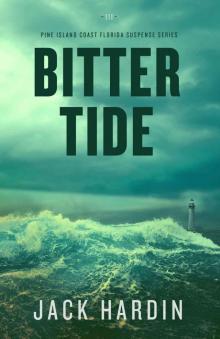 Bitter Tide
Bitter Tide Vacant Shore
Vacant Shore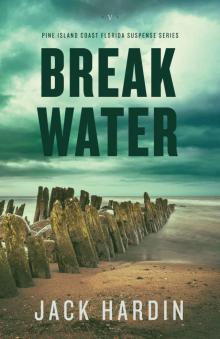 Breakwater
Breakwater The Apostate
The Apostate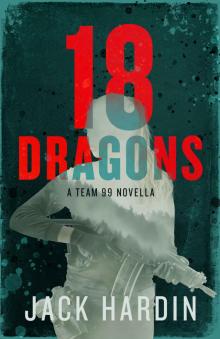 18 Dragons
18 Dragons Lonely Coast
Lonely Coast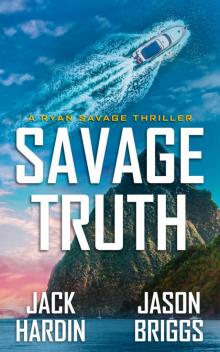 Savage Truth
Savage Truth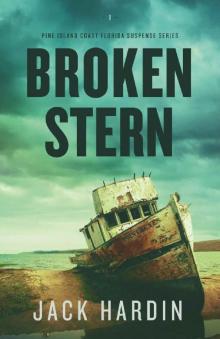 Broken Stern_An Ellie O'Conner Novel
Broken Stern_An Ellie O'Conner Novel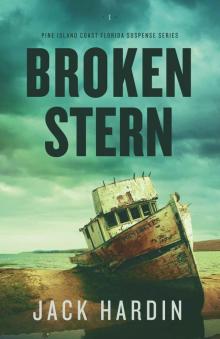 Broken Stern: An Ellie O'Conner Novel (Pine Island Coast Florida Suspense Series) Book 1
Broken Stern: An Ellie O'Conner Novel (Pine Island Coast Florida Suspense Series) Book 1